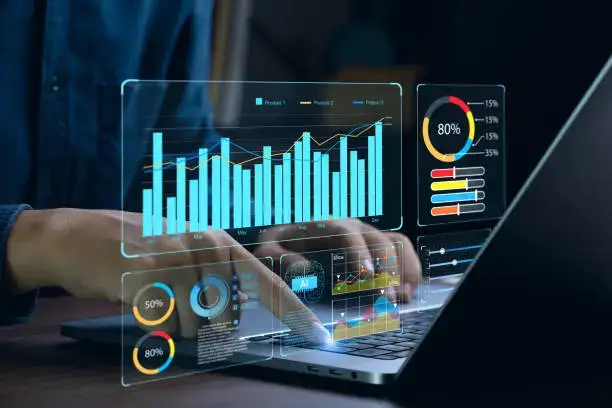The Best Fluffy Pancakes recipe you will fall in love with. Full of tips and tricks to help you make the best pancakes.
Table of Contents
Introduction to Personal Data Investment

The digital landscape has evolved significantly over recent years, making personal data an increasingly valuable asset. As individuals navigate online platforms, they inadvertently generate a wealth of information that can be harnessed for various purposes, including marketing, research, and product development. Learn more about : behavioral economics; This has led to the emergence of a new trend where both individuals and corporations are beginning to see personal data as an investment opportunity.
At its core, personal data encompasses all information related to an individual’s identity, preferences, and behaviors. The growth of data-driven economies has prompted companies to recognize the economic value embedded within this data. Organizations utilize analytics and deep learning to extract insights from the vast amounts of information collected, thereby optimizing their operations and crafting more effective marketing strategies. This shift has prompted a conversation around data ownership and the potential for individuals to monetize their own data assets.
However, the intersection of personal data and privacy raises important ethical and regulatory questions. As individuals’ awareness of their data rights expands, there is a growing demand for transparency in how personal data is used, as well as concerns over exploitation by large corporations. This highlights the need for robust frameworks that allow individuals to maintain control over their data while benefiting from its economic potential. In recent years, numerous platforms have emerged, enabling users to securely share their data in exchange for compensation or other forms of value, thus creating a marketplace for personal data.
As we delve deeper into the concept of personal data investment, it is crucial to unpack the complexities surrounding its market value, privacy implications, and the evolving nature of data ownership. Understanding these dynamics will set the stage for a comprehensive discussion on the viability and sustainability of investing in personal data within the contemporary economy.
Defining Personal Data in the Digital Economy
In the contemporary digital economy, personal data is recognized as a critical asset, pivotal to businesses and individuals alike. Personal data encompasses a wide array of information that can be used to identify, locate, or contact individuals. This includes traditional identifiers such as names, addresses, and phone numbers, but extends far beyond these to include a variety of digital footprints generated through online activities. For instance, data collected from social media interactions, website browsing history, and online transactions all contribute to a comprehensive profile of an individual.
The significance of personal data in the digital landscape cannot be understated. It fuels targeted advertising, enhances customer experience, and drives innovative services and products. Companies leverage this data to create tailored marketing strategies, predict customer behavior, and ultimately improve their competitive edge. Additionally, personal data is utilized in areas such as healthcare, finance, and retail, where understanding consumer preferences and habits can lead to improved outcomes and increased efficiency.
Furthermore, the monetization of personal data has opened new avenues for revenue generation. Organizations often aggregate and analyze vast amounts of information, selling insights to third parties or employing them to facilitate decision-making processes. This has led to a burgeoning data marketplace, wherein personal data is considered a valuable commodity. However, the ethical implications surrounding the collection and use of personal data remain a widespread concern, highlighting the need for a balanced approach that protects consumer privacy while allowing for the economic benefits of data utilization.
Recognizing the multifaceted nature of personal data is essential for understanding its role in today’s economy. As we delve further into the implications of data investment, it is crucial to consider both the opportunities and challenges related to personal data in this increasingly interconnected world.
The Rise of Data Brokers and Marketplaces

In recent years, the emergence of data brokers and online marketplaces has significantly transformed the landscape of personal data investment. Data brokers are entities that collect, analyze, and sell consumer information, often without the explicit consent of individuals. These companies aggregate data from various sources, including public records, social media platforms, and online transactions, presenting a detailed profile of consumers that is attractive to marketers, advertisers, and other third parties seeking targeted outreach.
Online marketplaces have further facilitated the trade of personal data, providing a platform where sellers can list their information and buyers can easily purchase it. These marketplaces often emphasize the benefits of acquiring detailed consumer insights, enabling businesses to enhance their marketing strategies and target potential customers more effectively. However, this rapid commodification of personal data has raised significant ethical and legal concerns. Many individuals are unaware that their data is being collected and sold, which poses questions about privacy and consent.
Moreover, the legal framework surrounding data brokerage is evolving but remains complex. In various jurisdictions, regulations such as the General Data Protection Regulation (GDPR) and the California Consumer Privacy Act (CCPA) aim to provide individuals with rights over their personal data. However, enforcement can be lax, and many data brokers exploit loopholes to continue their operations. As a result, consumers often find themselves in a precarious position, balancing the benefits of personalized services against their right to privacy.
The ethical implications of personal data trading are profound. Beyond privacy concerns, data broker practices can lead to discrimination and misuse of information. This reality underlines the necessity for ongoing discussions and regulatory advancements to ensure that consumers are adequately protected in an increasingly data-driven economy. The rise of data brokers and marketplaces, therefore, highlights both the potential value of personal data and the pressing need for greater transparency and accountability in its use.
Challenges and Risks of Personal Data Investment
Investing in personal data has garnered significant attention in recent years; however, it also brings forth a myriad of challenges and risks that both individuals and organizations need to navigate. One of the foremost concerns is privacy. As the boundaries of data collection expand, individuals often find themselves questioning the extent to which their personal information is being monitored and utilized. The intrinsic nature of personal data raises alarms about consent and ownership, making many wary of engaging in such investment opportunities.
Data security represents another critical challenge in the realm of personal data investment. The frequency of data breaches and cyberattacks has increased, exposing sensitive personal information to malicious actors. This not only leads to immediate financial loss but can also have long-term repercussions on an individual’s reputation and financial stability. Investors must remain cognizant of the security measures employed by companies handling personal data. Robust encryption and stringent data protection regulations are essential, yet they cannot guarantee absolute safety.
Moreover, the potential for misuse of personal information adds another layer of complexity to the investment landscape. Instances of identity theft and unauthorized data access have highlighted how personal data can be exploited for nefarious purposes. This risk is compounded when different entities share information without transparent practices, potentially leading to unintended consequences for individuals. Consequently, investors who are contemplating delving into this market may hesitate due to concerns over ethical implications and the safeguarding of their data.
In light of these challenges, it is crucial for potential investors to conduct thorough research and remain informed about the evolving landscape of personal data rights and regulations. A well-informed investor can make more confident decisions while mitigating risks associated with the investment in personal data.
Successful Case Studies of Personal Data Investment

In the evolving landscape of digital commerce, several individuals and companies have successfully leveraged personal data to drive innovation and profitability. One notable example is the ride-sharing giant Uber. The company utilizes vast amounts of personal data collected from users, including location and ride preferences, to optimize pricing strategies and improve customer experiences. By analyzing this data, Uber has not only tailored its services to meet the needs of its users but has also gained insights that have led to significant financial returns and a competitive edge in the market.
Similarly, companies like Netflix have made a mark by investing in personal data for content creation and recommendation algorithms. Netflix diligently collects user viewing habits and preferences, which enable it to recommend shows and films tailored to individual tastes. This data-driven approach has resulted in higher user retention rates and significant increases in subscription revenues. By channeling personal data to create engaging content, Netflix has demonstrated the substantial commercial potential of investing in customer insights.
On an individual level, entrepreneurs like the founders of SiriusXM utilized data analysis to determine consumer preferences for audio content, resulting in personalized broadcasting experiences. This unique approach has allowed them to refine their service offerings, ultimately leading to increased subscriber growth and higher revenue streams. The case of SiriusXM illustrates how personal data can be harnessed effectively, turning insights into actionable strategies that facilitate business success.
These examples highlight the profound impact of personal data investment on organizational growth and innovation. By understanding and utilizing personal data, both individuals and enterprises can unlock new opportunities for profitability and market differentiation. The evidence indicates that harnessing personal data, properly, can lead to promising outcomes, showcasing the spectrum of potential strategies for success in today’s data-driven business environment.
Legal Framework and Regulations Governing Personal Data
The landscape of personal data utilization is intricately woven with a variety of legal frameworks and regulations that govern its collection, storage, and processing. Notably, the General Data Protection Regulation (GDPR) and the California Consumer Privacy Act (CCPA) serve as significant benchmarks in this domain. The GDPR, which came into effect in May 2018 across the European Union, establishes stringent guidelines for the handling of personal information. It emphasizes the principles of data minimization and purpose limitation, mandating organizations to obtain explicit consent from individuals before processing their information. These requirements ensure that companies are held accountable for their data practices, thereby enhancing consumer trust.
On the other hand, the CCPA, enacted in January 2020, provides California residents with robust rights concerning their personal data, including the right to know what information is collected and the ability to opt out of data sales. As one of the most comprehensive data protection laws in the United States, the CCPA has influenced other states to consider similar measures. These regulations impact the investment landscape in personal data, making compliance not just a legal obligation but a strategic priority for organizations aiming to capitalize on data assets.
The implications of these laws are profound, as they not only dictate how businesses can monetize personal data but also compel them to implement rigorous data protection measures. Non-compliance can lead to severe financial penalties and reputational damage, necessitating that companies invest in compliance strategies. Therefore, understanding the legal framework is paramount for potential investors in personal data, as it shapes the avenues available for leveraging data while ensuring the protection of individual rights. Navigating these regulations is essential in mitigating risks and enhancing the value of personal data investments.
Ethical Considerations in Data Investment

As societies increasingly recognize personal data as a valuable asset, the ethical implications of treating this data as a commodity come to the forefront. One of the primary ethical considerations is the concept of informed consent. Individuals should be fully aware of how their data will be used, shared, and monetized. Failure to secure informed consent can lead to a breach of trust between consumers and companies, undermining the integrity of any data investment venture. Companies must prioritize clear communication regarding their data practices to empower individuals to make informed choices.
Another critical issue relates to the potential for exploitation. Vulnerable populations may be disproportionately affected by exploitative data practices. For instance, individuals with limited understanding of technology may unintentionally consent to data-sharing agreements that jeopardize their privacy. This raises concerns about power dynamics in data exchange where individuals may feel compelled to share their information in return for services or benefits. Companies engaged in data investment should actively work to safeguard these populations by ensuring that their practices are fair and just.
Moral responsibility also plays a vital role in how both companies and individuals manage personal data. Companies must navigate the fine line between leveraging data for profit and respecting the rights and privacy of data subjects. They should implement robust data protection policies and ethical guidelines, ensuring that data collection and utilization align with societal values. Individuals, on the other hand, should be encouraged to understand the implications of their data-sharing decisions. By advocating for transparency and accountability in data practices, both parties can contribute to a more ethical framework for data investment.
Future Trends in Personal Data Investment
The landscape of personal data investment is evolving rapidly, influenced by a myriad of factors, including technological advancements, shifting consumer attitudes, and potential regulatory changes. As we venture into the future, it is essential to explore the implications these elements may hold for the personal data market.
One significant trend is the rise of artificial intelligence and machine learning technologies. These advancements are transforming how personal data is analyzed and utilized. Organizations are leveraging AI to gain insights from vast datasets, allowing for more tailored and effective consumer engagement strategies. As these technologies continue to mature, we can expect an increased emphasis on predictive analytics, enabling companies to anticipate consumer needs with greater accuracy. This will drive a more nuanced investment in personal data, as businesses strive to align their offerings closely with individual preferences.
Moreover, consumer attitudes toward personal data sharing are evolving. As awareness of data privacy issues grows, consumers are becoming more selective about which organizations they share their information with. This shift may lead to a demand for more transparent data practices and ethical standards. Brands that prioritize ethical data management and respect user privacy are likely to gain competitive advantages, prompting a reevaluation of how personal data investment is approached. Companies may have to adapt by implementing robust consent frameworks and enhancing user trust through transparent communication.
Additionally, the regulatory landscape surrounding personal data is anticipated to become more stringent. With initiatives such as the General Data Protection Regulation (GDPR) and various data protection laws emerging globally, organizations must navigate complex compliance requirements. This shifting regulatory environment will necessitate careful consideration of personal data investments, as organizations will require strategies that are not only innovative but also compliant. These factors combined suggest that the future of personal data investment will be marked by a careful balancing act of technology, consumer trust, and regulatory adherence, fundamentally reshaping the market dynamics.
Conclusion: Navigating the Reality of Personal Data Investment

As we evaluate the potential for investing in personal data, it becomes increasingly clear that this topic holds both opportunities and challenges. The vast amount of information generated by individuals has made personal data a valuable asset in an increasingly digitized world. Companies across various sectors recognize the worth of consumer insights, often utilizing this data to enhance decision-making and drive innovation. However, the question of whether investing in personal data is a sound choice remains complex.
Throughout this discourse, we have highlighted some critical points. Firstly, the legal and ethical considerations surrounding personal data usage cannot be understated. Regulations such as the General Data Protection Regulation (GDPR) in Europe emphasize the importance of safeguarding individual privacy while navigating data investment. This regulatory landscape presents both a hurdle and an avenue for responsible participation within the market.
Secondly, technological advancements have created unprecedented possibilities in the realm of data analytics and investment strategies. Tools that harness artificial intelligence and machine learning greatly facilitate the processing and interpretation of large datasets. However, individuals considering investment in personal data must also be aware of the inherent risks, including data breaches and misuse of information, which could lead to severe consequences.
Ultimately, the viability of personal data investment is contingent upon a thorough understanding of its implications. Readers are encouraged to reflect on how personal data influences their lives, whether through targeted advertisements, personalized services, or even the choices they make daily. By fostering a thoughtful perspective on the nuances of personal data, we can navigate this dynamic landscape more adeptly, recognizing both its potential benefits and its critical challenges. The conversation surrounding personal data investment warrants ongoing exploration and discussion, making it a pertinent topic for consideration.
ai monetization artificial intelligence behavioral economics blogging guide bubble cryptocurrency budgeting strategies budget management business business days business license business plan business plans cryptocurrency creation debt management debt strategies decentralized finance earn money finance development financial app financial planning fintech services freelance business freelancing business home earnings investment methods investment stocks invest stocks marketing services money blogging money management money online personal budget personal budgeting personal data personal finance real estate remote work side business small business start start business stock investment stock market stock trading successful businesses
personal data investment easy now in 2025
The digital landscape has evolved significantly over recent years, making personal data an increasingly valuable asset. As individuals navigate online platforms, they inadvertently generate a wealth of information that can be harnessed for various purposes, including marketing, research, and product development. Learn more about : behavioral economics; This has led to the emergence of a new trend where both individuals and corporations are beginning to see personal data as an investment opportunity.





